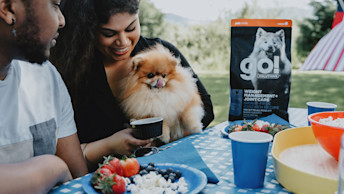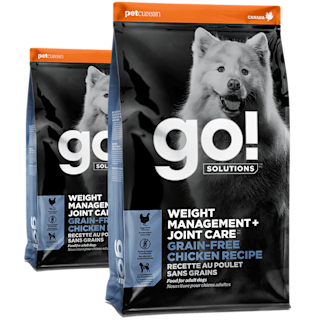May 6, 2024
How to Comfort a Dog with Pancreatitis

Dogs, much like their human companions, can face various health challenges, including pancreatitis. If you're noticing symptoms or if your dog has received a diagnosis, understanding the condition and how to manage it through diet and nutrition is crucial for any pet parent.
What is Pancreatitis in Dogs?
Pancreatitis is the inflammation of the pancreas. Your dog’s pancreas serves two main functions: it produces enzymes to help digest food, and it secretes insulin to help regulate blood sugar levels.
When a dog’s pancreas is inflamed, these two main jobs are hindered, and the enzymes that are supposed to be digesting food begin to attack the pancreas and cause significant harm.
Pancreatitis in dogs is a severe disease, which can be a chronic condition, or occur suddenly. In some cases, it can cause lifelong complications and often occurs in conjunction with diabetes in dogs.
Symptoms of Pancreatitis in Dogs
If you notice symptoms or behavioral changes it’s important to immediately seek veterinary attention. Bouts of pancreatitis often occur after a fatty meal or treat, so this may be an important factor to consider.
Some Signs of Pancreatitis in Dogs:
- Nausea and vomiting
- Fever
- Lethargy
- Abdominal pain, diarrhea and decreased appetite
- Preference to stand with the rear end in the air, and head and feet on the floor or a hunched back
If you notice one or multiple symptoms appearing suddenly, take your dog to the vet immediately to be checked for pancreatitis. Pancreatitis can be acute and short-lived, but can also become chronic and do lasting damage. It's important to watch for symptoms, get veterinary care, and potentially make diet changes to help dogs recover from flare ups and prevent future recurrences.
What to Feed a Dog with Pancreatitis
The diet you feed your dog plays a crucial role in managing pancreatitis. High fat meals and snacks can trigger flare ups and make the condition worse. The ideal fat content for a pancreatitis prone dog is not established, and recommendations often come from a veterinarian's clinical experience. That being said, 8-10% in kibble is a common recommendation.
Foods to Avoid If Your Dog Has Pancreatitis:
- Processed human foods
- Fatty cuts of meat or skin
- Fatty dairy products
- Oily fish proteins
- Diets high in fat or with variable & unpredictable fat content
The pancreas produces enzymes that help break down food. But with pancreatitis, these enzymes activate too early, causing the pancreas to essentially attack itself and become inflamed.
The pancreas is one of the primary organs responsible for enzymes which digest fat, which is why a high-fat meal may over trigger this production, and lead to a pancreatitis attack.
Many vets will recommend switching to a healthy weight management, highly digestible diet for dogs with pancreatitis. These diets are typically lower in fat, which can be helpful to reduce work on the pancreas and avoid triggering an attack.

Recommended Solution
Lower Fat Dog Food Solutions
Maintaining your dog's healthy weight is one of the best ways to prevent health issues. These recipes feature up to 38% less fat than our other recipes, with highly digestible lean protein and grain as a source of fibre.
Weight Management dog food
This can help reduce the workload on the pancreas and potentially shorten the duration of the inflammation. Consult your vet for the most appropriate diet for your individual dog.
Be sure that when transitioning your dog to a new diet you do so gradually over a minimum of 10 days. Sudden changes can upset your dog's digestive system and cause additional issues.
Safe Treats for Dogs with Pancreatitis
When managing pancreatitis in dogs, it's important to be careful about treats. Many commercial dog treats are high in fat, which can exacerbate pancreatitis. However, you can give your dog some safe, low-fat treats in moderation. Here are some good options:
Lean Meat Jerky: Look for jerky dog treats made from lean meats like chicken or turkey, and a low reported fat content with minimal added ingredients. This provides a tasty source of protein without adding extra fat.
Carrots: Fresh carrots make for a satisfying crunchy snack for dogs. They are low in calories and high in fibre. Just be sure to cut the carrots into bite-sized pieces.
Apple Slices: Sliced apples are a refreshing, hydrating treat for dogs. Be sure to remove any seeds and cores first!
Weight Management Dog Treats: Low fat commercial dog treats may be an option when looking to treat your pup, but still want to manage and control your dog’s pancreatitis.
The key is to keep portions of these low-fat treats small and limit them to a few times a week. Remember that treats should never exceed 10% of your dog’s daily caloric intake. Check with your vet if you have any concerns about appropriate treats for your dog.
When to See the Vet
Be sure to see your vet if your dog’s symptoms worsen or persist. Seeing the vet regularly is important for dogs prone to repeated pancreatitis flare-ups. The vet can help determine potential causes and recommend ways to prevent future episodes, or underlying health issues which may be contributing. Don't hesitate to contact your vet if you have any concerns about your dog's recovery or ongoing management.
Canadian Academy of Veterinary Nutrition (CAVN), Erico Ribeiro, MV, PhD, DVSc Candidate, ECVCN Resident. "Nutrition and Pancreatic Disease in Dogs." VCA Hospitals. Accessed April 24, 2024. https://vcahospitals.com/know-your-pet/nutrition-and-pancreatic-disease-in-dogs.
"Pancreatitis and Other Disorders of the Pancreas in Dogs." Merck Veterinary Manual. Accessed April 24, 2024. https://www.merckvetmanual.com/dog-owners/digestive-disorders-of-dogs/pancreatitis-and-other-disorders-of-the-pancreas-in-dogs.



